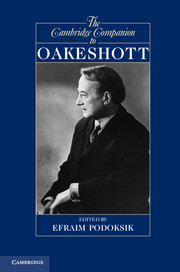Book contents
- Frontmatter
- Introduction
- Part I Oakeshott's philosophy
- Part II Oakeshott on morality, society and politics
- Part III Oakeshott and others
- 11 Oakeshott in the context of British Idealism
- 12 Oakeshott in the context of German Idealism
- 13 Oakeshott's contribution to Hobbes scholarship
- 14 Oakeshott and the Cold War critique of political rationalism
- Bibliography
- Index
12 - Oakeshott in the context of German Idealism
from Part III - Oakeshott and others
Published online by Cambridge University Press: 28 September 2012
- Frontmatter
- Introduction
- Part I Oakeshott's philosophy
- Part II Oakeshott on morality, society and politics
- Part III Oakeshott and others
- 11 Oakeshott in the context of British Idealism
- 12 Oakeshott in the context of German Idealism
- 13 Oakeshott's contribution to Hobbes scholarship
- 14 Oakeshott and the Cold War critique of political rationalism
- Bibliography
- Index
Summary
INTRODUCTION
German philosophical culture, as we know, had a pivotal influence on Michael Oakeshott's thought. It was not the first foreign intellectual tradition with which Oakeshott became acquainted in the original language. His first such interest (as a young student) was French thought. He would regularly borrow foreign books in French (Rousseau, Voltaire) from his college library, and one of his earliest essays contains a list of bibliography that testifies to his extensive reading of French authors. From the mid 1920s onwards, however, it was Germany that attracted him more and more. He travelled there quite often; began to read German authors in the German language; taught contemporary German philosophers (such as Heidegger and Husserl); and his works began to be filled with references to German texts.
This in itself is not very remarkable. Germany in the early twentieth century was, in many respects, the centre of the humanities (and of philosophy, in particular), and in terms of that period the prestige of its universities was certainly no less than that enjoyed by certain American universities in more recent times. It is not surprising, therefore, that a young talented Briton would turn his eyes towards Germany. Moreover, British intellectual life itself included traditions that self-consciously followed what were recognized to be German ideas. These ideas were regarded as representing an intellectual alternative to the ‘mainstream’, characterized, as it were, by sensualism, empiricism or methodological individualism.
- Type
- Chapter
- Information
- The Cambridge Companion to Oakeshott , pp. 274 - 295Publisher: Cambridge University PressPrint publication year: 2012
- 2
- Cited by



